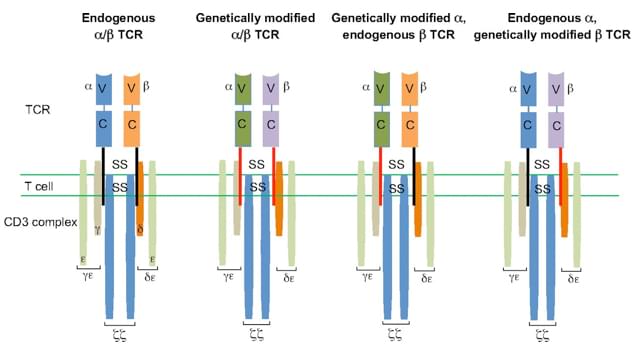Creative Biolabs provides various techniques such as flow cytometry-based FRET, immunoprecipitation and western blotting for TCR pairing assay. Mispaired TCR heterodimers may result in the diluted expression of TCR transgene or the generation of autoreactive TCR, which affect the efficacy and safety of TCR engineered T cell therapy subsequently. It is a challenge to optimize TCR pairing issue.
 Fig.1 TCR α- and β-chain pairing and mispairing.1
Fig.1 TCR α- and β-chain pairing and mispairing.1
In the strategy of TCR-transfer, the modified T cells often have lower avidity than the parental T cells, which is one difficulty to achieve wild-type levels of TCR expression, resulting in limited efficacy. In order to solve the problem, the TCR chains should be initially selected for appropriate affinity and the vectors need to achieve and maintain high-level expression. Even these factors are met, there is also the possibility that the introduced exogenous TCR α and β chains assemble with the exogenous TCR αβ pairs, which decrease T cell avidity. Besides these, mismatched pairs may generate novel TCR pairs of undefined and have potentially self-reactive specificity. Various strategies have researched to facilitate TCR chains matched pairing. It is demonstrated that introducing cysteines residues into the constant region of TCRα and TCRβ chains can promote preferential pairing with each other, increase total surface expression of the introduced TCR chains, and reduce mismatching with endogenous TCR chains.
Moreover, we can evaluate TCR pairing and carry out optimized strategies to promote proper pairing by cell-based emulsion RT-PCR, generation of an exclusive TCR heterodimer, murine-human hybrid TCR or chimeric TCR. Our customer-oriented services are supplied to meet your requirement about TCR.
In the process to assess TCR pairing, flow cytometry-based FRET, immunoprecipitation and western blotting are generally used. Besides these classical methods, probes-based approach can also be developed. Based on the specific requirements of every client, scientists from Creative Biolabs can design and select appropriate strategies to assess TCR gene transfer.
To discuss your demands or to request a proposal, please contact us by .
Reference
For any technical issues or product/service related questions, please leave your information below. Our team will contact you soon.
All products and services are For Research Use Only and CANNOT be used in the treatment or diagnosis of disease.
 NEWSLETTER
NEWSLETTER
The latest newsletter to introduce the latest breaking information, our site updates, field and other scientific news, important events, and insights from industry leaders
LEARN MORE NEWSLETTER NEW SOLUTION
NEW SOLUTION
CellRapeutics™ In Vivo Cell Engineering: One-stop in vivo T/B/NK cell and macrophage engineering services covering vectors construction to function verification.
LEARN MORE SOLUTION NOVEL TECHNOLOGY
NOVEL TECHNOLOGY
Silence™ CAR-T Cell: A novel platform to enhance CAR-T cell immunotherapy by combining RNAi technology to suppress genes that may impede CAR functionality.
LEARN MORE NOVEL TECHNOLOGY NEW SOLUTION
NEW SOLUTION
Canine CAR-T Therapy Development: From early target discovery, CAR design and construction, cell culture, and transfection, to in vitro and in vivo function validation.
LEARN MORE SOLUTION